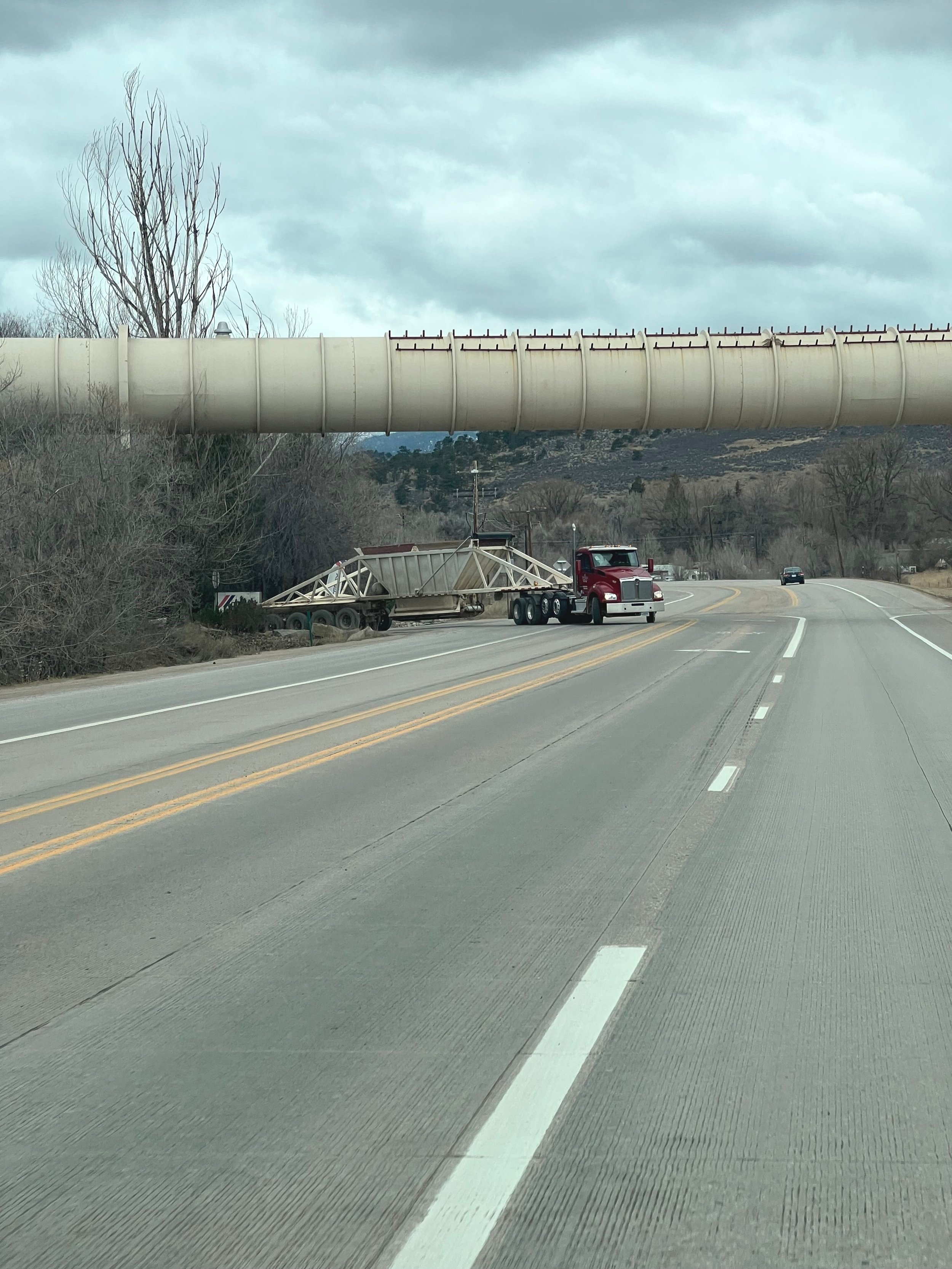
Martin Marietta Legal Battle
Ensuring that permit expirations are upheld and protecting the St. Vrain Valley from a NEW ~800-acre open-pit gravel mine.
The tranquil and largely untouched St. Vrain Valley, east of the CEMEX plant, became the center of a critical environmental struggle in 2017. It was then that local residents discovered Martin Marietta's intentions to activate a long-dormant Special Use permit.
This permit, if executed, would transform approximately 800 acres of the Valley into an extensive open gravel pit, irreversibly altering the landscape and ecosystem.
And that’s how Save Our St. Vrain Valley (SOSVV) came to be. We like to say that we are as grassroots as it gets, and we’re passionately dedicated to preventing the industrialization of this ecologically vital watershed.
Seven years later, SOSVV has successfully staved off Martin Marietta’s 800-acre gravel mine through a series of legal victories. Martin Marietta, however, continues to challenge court rulings that their long-standing permit had lapsed. Their latest appeal was filed in District Court in November 2023. This begins another chapter in this ongoing saga, demanding SOSVV's continued vigilance and legal defense.
Our amazing legal team at Ireland and Stapleton estimates that upholding our legal victories with Martin Marietta’s latest appeal will cost approximately $35,000.
We desperately need your help to raise this money.
Community and Environmental Impact
-

Community Impact
The proposed 800-acre open pit gravel mine by Martin Marietta posed a substantial threat to the St. Vrain Valley community. This large-scale industrial operation would have drastically altered the landscape, leading to increased noise pollution, heavy traffic from haul trucks, and potential health hazards from dust and air pollution. The peace and tranquility of this historically quiet area, cherished for its natural beauty and outdoor recreational opportunities, would have been compromised. The mine's presence could have also impacted property values, strained local infrastructure, and altered the character of the community, turning a once serene valley into an industrial zone, disrupting the daily lives and well-being of its residents.
-
Environmental Impact
Martin Marietta's proposed gravel mining project threatened significant environmental consequences for the St. Vrain Valley. Spanning 800 acres, this project risked severely disrupting local ecosystems, leading to habitat destruction, loss of biodiversity, and potential contamination of water sources. The mining activities would have transformed the natural landscape into excavated pits, altering the natural flow of St. Vrain Creek and potentially exacerbating flood risks, as noted in the St. Vrain Creek Watershed Master Plan. Furthermore, the project's location in a designated "Geologic Hazard Area" with moderate flood risk highlighted the potential for further geological instability and environmental degradation, contradicting Boulder County's discouragement of intensive uses in such areas.
-

Archaeological Impact
The St. Vrain Valley holds deep archaeological and cultural significance. This area, rich in historical and prehistoric sites, has been identified as containing artifacts and structures eligible for the National Register of Historic Places. The proposed mining project risked disturbing these irreplaceable archaeological resources, including ancient burial sites and artifacts indicative of the valley's early inhabitants. The land's cultural importance to the Native American community, evidenced by ceremonial activities and the presence of significant archaeological finds, underscores the need for its preservation. Protecting these sites is not only a matter of respecting historical legacies but also of upholding the cultural and spiritual heritage that the St. Vrain Valley embodies.

The landmark ruling upholding the 5-year lapse provision in Boulder County's land use code marks a significant victory for SOSVV and our community. It's a powerful affirmation of our commitment to environmental stewardship and community rights, setting a precedent for responsible and sustainable land use in our valley.
— Amanda Dumenigo, SOSVV Co-Founder and Chair
More Information About Martin Marietta’s Special Use Permit
Boulder County Special Use Permit SU-96-18: The County’s Citizen Access website has selected information on file from the previous County permit approval, and will be updated as more information is received. Select ‘Documents’ under the ‘Record Info’ tab.
The following is a brief history that SOSVV members compiled about Boulder County land use approvals for mining operations at the “Lyons Pit.”
-
August 30, 1973. Docket 476 was approved to open the Rockin’ WP Pit (Western Paving). The pit consisted on 194.23 acres. Up to 10% of material excavated was permitted to be hauled by truck, the remainder by rail. The hours of operation were limited to 7 am – 6 pm, Monday through Saturday.
August 22, 1977. Amendment 2 approved revisions to original mining and reclamation plans and also allowed for the addition of a portable crusher.
-
January 15, 1981. Special Use 80-26. Western Mobile Inc. leased the 115-acre Gregory (a.k.a. Miller) Pit. Conditional approval was granted to the company to mine on August 24, 1981. The lease expired and Frontier Materials purchased the lease area from Ron Gregory.
September 1984. Special Use 80-26, Amendment 1. Frontier Materials began to mine the Gregory Pit as the operator. This amendment was conditionally approved October 2, 1984. Western Mobile, Inc. leased the land back from Frontier to mine. Western Mobile eventually acquired Frontier in 1992.
February 7, 1985. Amendment 3 allowed for an additional 43 acres and added Lake 4 (a sealed reservoir) to the mining area. The estimated annual production was 500,000 to 600,000 tons. The hours of operation were modified to 7 am to 5 pm, Monday through Saturday.
-
May 26, 1992. Special Use 92-1. The Miller Pit amendment, conditionally approved by the Boulder County Commissioners allowed for the following: Western Mobile Inc. as the operator; truck haul restrictions of 200 average daily trips, with a maximum of 240 daily trips; and a life of the mine of approximately 10 years (1992-2002).
August 20, 1996. Special Use 96-18. The Lyons Comprehensive Land Use amendment allowed for a mine life of 30 years beginning January 2003. The 30-year mining area will begin following the completion of mining of the Miller Pit. This special use permit repealed all previous docket items and special use approvals consolidating the special use history pertaining to the Lyons (Rockin’ WP, Miller Pit et al) with the county. From this point forward, in county documents the pit is only referred to as the Lyons Pit.
- Western Mobile’s Concept Mining Plan, dated May 21, 1996 [PDF]
In 1997, Steve Jones prepared two reports about bird habitat use and conservation on the land.
- Habitat Use by Breeding Birds on Western Mobile Boulder, Inc. Lyons Property, August 1, 1997 [PDF]
- Habitat Conservation for Birds of Prey on Western Mobile Boulder, Inc. Lyons Property, August 30, 1997 [PDF]
January 22, 1998. Resolution 98-32 conditionally approved Docket # SU-96-18.
- Resolution 98-32 [PDF], August 20, 1998.
Boulder County Open Space entered into an agreement with Western Mobile to purchase all company owned land over a phased period of time, beginning in 1998.
June 30, 1999. Development Agreement for Docket # 96-18 adopted.
-
October 17, 2006. Special Use 96-18. Phase I of the mining plan approved in Docket SU 96-18 is withdrawn by Lafarge and is no longer a part of the Docket’s special use approval. Clarifications are added to Resolution 98-32.
October 17, 2006. Land Use Department letter to Steven Brown, Lafarge, Inc. [PDF]
2011. The properties were acquired by Martin Marietta Materials, LLC.
-
2011. The properties were acquired by Martin Marietta Materials, LLC.
August 9, 2011. Review document uploaded by Boulder County to its Citizen Access website. Contains clarifying info about the applicability of the conditions of approval to the Miller Pit.
Applicability of Conditions of approval for Docket SU-96-18: “Western Mobile Boulder Open Mining Special Use Review” [PDF]
Request to Approve Site Plan, SU 96-18, Martin Marietta Materials (Rockin’ WP North).
January 3rd, 2017. Commissioners Business Meeting Agenda Item. [PDF]
January 24, 2017. Land Use Department letter to Summer Howard of TetraTech, indicating that the site plan was approved January 3, 2017. [PDF]
July 12, 2017. Letter from attorney Mark Matthews, representing Martin Marietta Materials, to Dale Case, Boulder County Land Use Director, describing why MMM believes that Special Use Permit SU-96-18 has not lapsed due to a five-year period of inactivity. SOSVV notes that the letter includes no documentation as evidence to illustrate that these activities actually occurred.
April 11, 2018. Dale Case, Boulder County Land Use Director, determined that the Special Use approved in Docket SU-96-18 has not lapsed, as noted in a letter to Mark Mathews, attorney representing Martin Marietta Materials. SOSVV had thirty days to appeal.
May 10, 2018. SOSVV files a letter of appeal with the Boulder County Board of Adjustment regarding Director Case’s decision that the permit had not lapsed. SOSVV asserted that Director Case exceeded his authority and incorrectly applied this lapse provision, Section 4-604(C) of Boulder County’s Land Use Code, and that there is no evidence that any mining has occurred on any portion of the subject site since at least 2006, and Special Use 96-18 has long since lapsed due to inactivity. SOSvv asserts that the Director erred in his interpretation of Section 4-604(C) and that this interpretation is not consistent with the Land Use Code’s bedrock purpose to protect health, safety, and general welfare.
July 27, 2018. SOSVV appears at the appeal hearing before the Boulder County Board of Adjustment (watch proceedings here). 3 of 5 Board members agree with SOSVV’s position that the permit had lapsed due to inactivity, however a supermajority of four votes is required to overturn the Director’s decision. SOSVV is currently planning next steps.
August 2018. SOSVV has since filed an appeal in District Court and is pending a hearing date.
-
June 2020. SOSVV filed a reply brief and a Request for Oral Argument with the Court.


